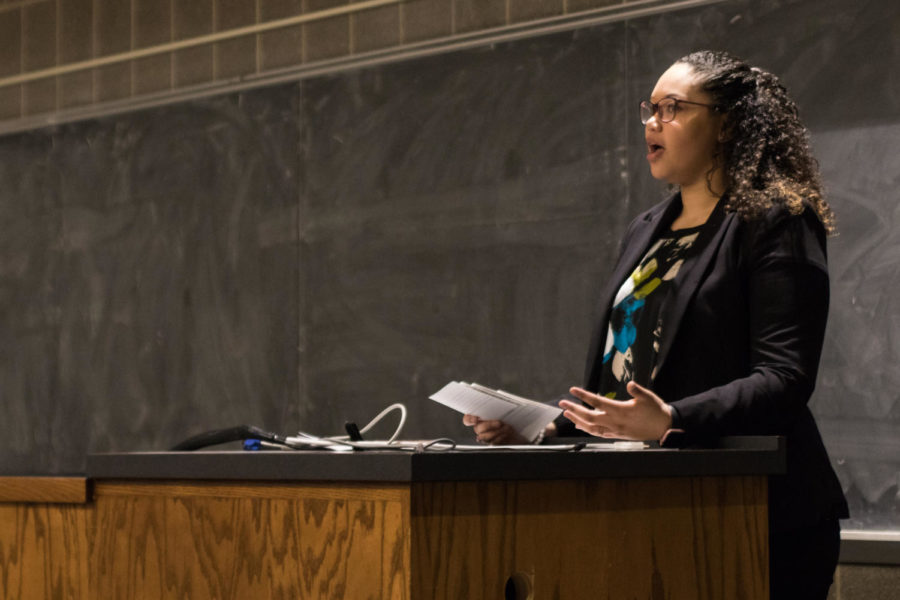StuGov VP candidates differ on campaign promises, Veishea, during debate
February 20, 2018
Prioritizing safety.
For vice presidential candidates Juan Bibiloni and Jocelyn Simms, this a campaign platform both can agree upon for the future of Iowa State.
Debating face-to-face Tuesday evening, the candidates gauged questions on campus climate, budget cuts, sexual misconduct prevention and their platforms.
Bibiloni is running alongside Julian Neely, their campaign slogan being #movingforwardISU. Simms and her running mate Benjamin Whittington are hoping to unlock Iowa State’s potential.
In their opening statements, Bibiloni emphasized his drive to give back to the Iowa State community and Simms touted that should she be elected, she would make Student Government as transparent as possible.
She also asked students not to count her slate out just because they don’t have previous Student Government experience.
“We can personally relate to the problems that students face on a daily basis,” Simms said.
Simms is one of the founding members of Delta Gamma at Iowa State. She also serves as the treasurer and poetry board editor of Sketch Literary Journal, as well as the secretary of the Iowa State Turning Point USA chapter.
Bibiloni represents the Inter-Residence Hall Association as a current senator for Student Government and on the CyRide Board of Trustees.
While the debate began roughly seven minutes late, there were nearly 35 people in attendance. It lasted for nearly an hour, with Bibiloni and Simms reserving rebuttals for their opposition’s platform toward the end.
Clashing points included the Whittington-Simms campaign promise to bring back Veishea as well as the Neely-Bibiloni campaign promise to enact a mentorship program dubbed Cyclone-to-Cyclone and its similarities to learning communities.
“Julian and I don’t want to reinvent the wheel. We want to work with those programs such as learning communities and other mentorship programs in the university to make sure that those mentorship programs currently in place are effective and through trying to transform them into a Cyclone-to-Cyclone network,” Bibiloni said.
Simms, however, felt that an additional program would take away from the learning communities and wouldn’t be necessary.
“An idea I had was just increasing the education toward learning communities and making sure they know what they are supposed to be doing,” Simms said. “I’m not sure making a whole initiative called Cyclone to Cyclone would be effective or needed.”
Bibiloni rebutted arguing that he saw Cyclone to Cyclone umbrellaed with learning communities so students “can partner with upperclassmen and be informed of the realities of their major.”
Veishea was another point of debate for the two campaigns.
According to Simms, their campaign hopes to recreate Veishea in the form of a ten-day university festival.
“A big part of our platform is setting out a clear and concrete plan on how we would bring this to the university and what exactly we have in mind for it,” Simms said.
Simms said that they feel the benefits of a festival similar to what once Veishea represented outweigh the cons of what it turned into.
Bibiloni, however, argued that Student Government is already working toward bring new traditions that already have support from the university.
“When Julian and I think of Veishea we think of community within students, we think of the tradition of coming together and celebrating the fact that we’re Cyclones,” he said. “Student Government has actually taken steps to try and bring back tradition through the Cyclone Carnival and the spring concert coming up.”
Simms rebutted saying that having a bunch of different and separate events does not have the same effect like Veishea once did.
The two campaigns also have similarities in their platforms, such as an investment in making the ISU Alert system more transparent and widespread.
Bibiloni and Simms also said they hope to increase outreach of the Green Dot program implemented last year to help raise awareness to sexual assault and misconduct as well as bystander intervention.
In their closing announcements, Simms said she hopes to work “with, not above” students and Bibiloni asked students to consider: “Who has best represented you in the past and who will best represent you in the future?”







